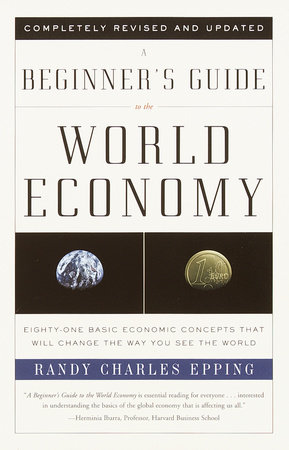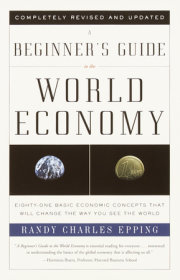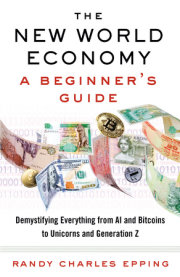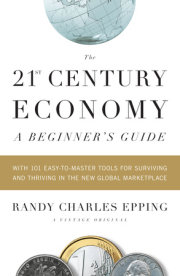INTRODUCTION
1. What Is the World Economy?
2. How Is Wealth Determined Around the World?
3. What Is Macroeconomics?
4. How Does International Trade Work?
5. What Is Globalization?
6. What Are Trade Surpluses and Deficits?
7. What Is Money?
8. What Are the World’s Major Currencies?
9. What Is the Euro?
10. What Is Virtual Money?
11. What Are Freely Floating Currencies?
12. What Are Exchange Rates?
13. What Is GNP/GDP?
14. How Are the World’s Economies Compared?
15. What Is Money Supply?
16. What Is Inflation?
17. What Is a Central Bank?
18. How Do Central Banks Regulate an Economy?
19. How Are Interest Rates Used to Control Economic Growth?
20. What Is Free Trade?
21. What Are Quotas, Tariffs, and Subsidies?
22. What Is the WTO?
23. Who Invests in the Global Marketplace?
24. What Is Equity?
25. Why Are Companies Referred to as Ltd., Inc., GmbH, or S.A.?
26. What Is a Balance Sheet?
27. What Is a Profit and Loss Statement?
28. What Is Net Worth?
29. What Is Bankruptcy?
30. What Is Venture Capital?
31. What Is an IPO?
32. What Is a Leveraged Buyout?
33. What Is a Multinational?
34. What Are the Risks of International Investing?
35. What Is a Stock Index?
36. How Do Investors Buy Foreign Shares?
37. What Is an Equity Fund?
38. What Is a Capital Market?
39. What Is a Bond?
40. What Are Eurocurrencies and Eurobonds?
41. How Are Ratings Used to Evaluate International Investments?
42. How Is Gold Part of the World Economy?
43. What Are Derivatives?
44. What Is an Option?
45. What Are Stock Options?
46. What Is a Currency Option?
47. What Is a Hedge Fund?
48. What Is Hot Money?
49. What Is the New Economy?
50. How Can New Economy Companies Be Compared to Traditional Companies?
51. What Is E-Commerce?
52. What Is the European Union?
53. How Are Communist Countries Transformed by Capitalism?
54. How Is the Former Soviet Bloc Being Integrated into the World Economy?
55. What Are the Tiger Economies of Southeast Asia?
56. What Is Japan Inc.?
57. What Is the Third World?
58. What Is Hyperinflation?
59. What Causes the Income Gap Between Rich and Poor Countries?
60. What Can Be Done to Promote Third World Development?
61. What Is the World Bank?
62. What Is the IMF?
63. What Are Economic Austerity Plans?
64. What Is Dollarization?
65. What Is NAFTA?
66. What Are Free-Trade Megazones?
67. What Are the OECD and G7/G8?
68. What Are Regional Development Banks?
69. What Role Do Charities and NGOs Play in the World Economy?
70. How Is Corruption Part of the World Economy?
71. What Is Money Laundering?
72. How Does a Swiss Bank Account Work?
73. What Are Tax Havens?
74. How Are Illegal Goods Traded on the World’s Black Markets?
75. What Is Economic Espionage?
76. How Is the Environment Affected by the World Economy?
77. How Can Economic Incentives Be Used to Reduce Pollution?
78. How Does Immigration Affect the World Economy?
79. How Are Slavery and Child Labor Part of the World Economy?
80. What Is the Effect of the AIDS Epidemic on the World Economy?
81. What Are Economic Sanctions?
GLOSSARY










